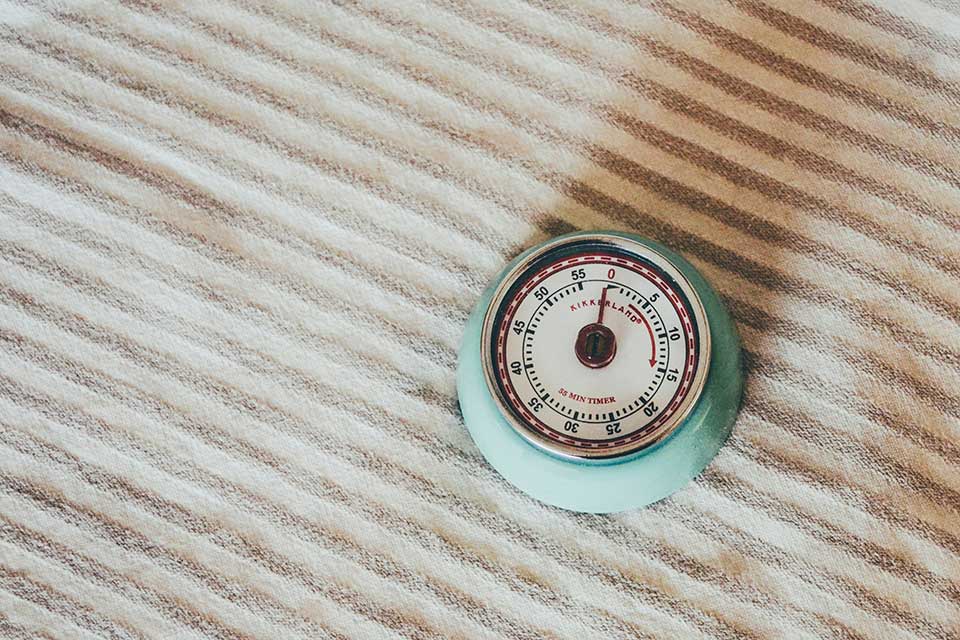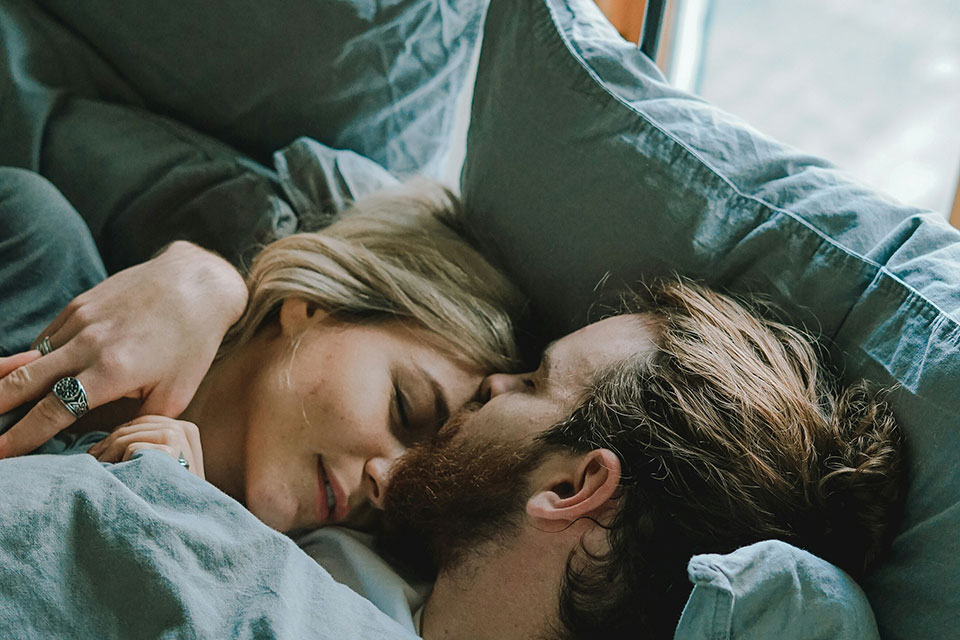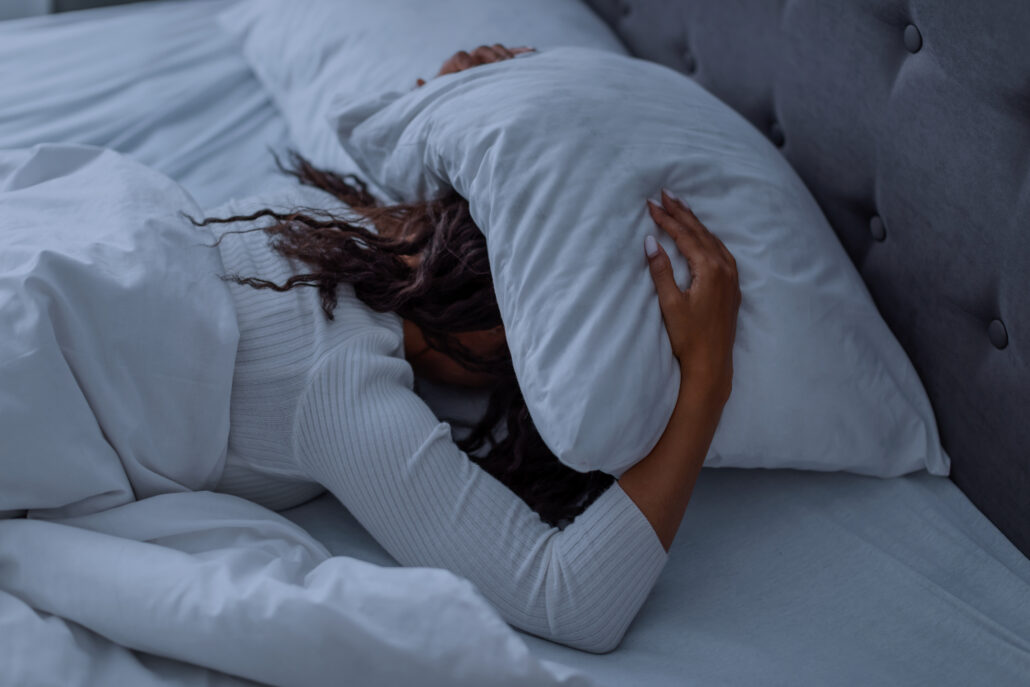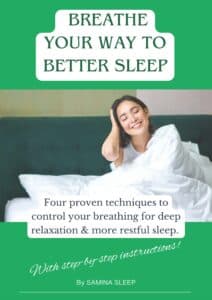Maximizing Your Zzzs: The Lowdown on Sleep Efficiency – Better Sleep Council

If you’re tired of waking up in the morning feeling fatigued and like you could use a few more hours of rest, it might be time to check in on your sleep efficiency.
Let’s unravel the mystery of sleep efficiency and figure out why it matters in our everyday lives, plus we’ll sprinkle in some tips for a sleep game that’s strong and efficient!
Sleep efficiency is the percentage of time spent catching quality Zzzs in comparison to the total time spent in bed—because, let’s face it, spending an hour scrolling on social media before falling asleep doesn’t count towards your sleep efficiency (#unfortunately).
Want to calculate your sleep efficiency? Use this simple formula: (Total Sleep Time / Total Time in Bed) x 100. For example, if you spend eight hours in bed but only six hours asleep, your sleep efficiency percentage is 75%. Not bad! A high sleep efficiency percentage generally means less time tossing and turning and more time soaking in those sweet, sweet restorative sleep stages.
Life’s Snoozin’, Why Calculate Sleep Efficiency?
You might wonder, ‘Am I supposed to turn into a sleep mathematician now?’ Absolutely not! Most folks won’t be crunching numbers nightly; instead, think of sleep efficiency as your sleep compass. It’s like having a trusty guide pointing out the general direction to your best sleep. Certainly not an exact science, a low sleep efficiency score simply encourages you to consider what might be affecting your sleep—from stress and inconsistent sleep schedules to that extra cup of coffee in the afternoon. Think of it like your personal compass, guiding you toward a more well-rested version of yourself.
Top Tips for Sleep Efficiency: Making Zzzs Count
Enough about the technicalities, let’s talk tips! Want to amp up your sleep efficiency and make those Zzzs count? Here’s the scoop:
Stick to a Sleep Schedule
Being the bedtime rebel might sound cool, but your body loves consistency. Stick to a regular sleep routine to keep your internal clock in sync and your sleep efficiency soaring.
Create a Chill Bedtime Routine
Cue the wind-down rituals! Whether it’s reading a book, taking a warm bath, or perfecting your meditation game, these activities signal to your body that it’s time to catch those Zzzs.
Deck Out Your Sleep Space
Turn your bedroom into a sleep haven. Think dark, quiet, and cool. Invest in a comfy mattress and pillows for a sleep sanctuary that invites the Zzzs.
Screen Curfew Before Bed
Minimize screen time an hour before bedtime. Those devices emit blue light that can mess with your circadian rhythm, negatively affecting your sleep and making your sleep efficiency do the cha-cha.
Watch What You Eat and Drink
Be mindful of your evening snacks and sips. Heavy meals, caffeine, and nightcaps can be the sleep efficiency grinches, so enjoy them earlier in the day.
Move That Body Regularly
Exercise isn’t just for gym buffs; it’s your sleep BFF. Regular physical activity has a direct link to better sleep quality. Move that body, but try to wrap up the intense workouts a few hours before bedtime.
Unlocking the Sleep Efficiency Superpower
Now you’ve got the 411 on sleep efficiency. By sprinkling in these tips and making a few lifestyle tweaks, you’ll be well on your way to a sleep efficiency percentage that deserves a round of applause.
Here’s to making the most of your Zzzs and waking up feeling refreshed and ready to conquer the day!
Craving Midnight Snacks? Discover Healthy Options for Late-Night Nibbles – Better Sleep Council

We’ve all been there, tiptoeing to the kitchen in the stillness of the night, lured by the siren call of midnight cravings. But before you surrender yourself to the greasy leftover pizza, sugary cereals, and salty chips, you might want to check your craving and opt for healthy late-night snacks that can satisfy your taste buds AND contribute to a quality night’s sleep.
Believe it or not, your choice of midnight snack can impact your sleep. Opting for snacks high in refined sugars may contribute to disrupted sleep. Instead, choosing whole grains stabilizes blood sugar levels, promoting a more restful sleep. Certain foods, like dairy and nuts, contain tryptophan, a precursor to sleep-regulating neurotransmitters, serotonin, and melatonin. Additionally, heavy or spicy snacks can cause discomfort, while light, easily digestible choices contribute to a comfortable night’s rest.
So, the next time the midnight munchies strike, consider these healthy late-night snacks that won’t leave you tossing and turning.
The Nutty Delight
Nuts, the unsung heroes of the snack world, are packed with nutrients and can be an excellent midnight snack option. Almonds, cashews, and walnuts, in particular, provide a good source of magnesium, a mineral that promotes relaxation and sleep. They also contain tryptophan, a sleep-inducing amino acid that helps the body make both serotonin and melatonin. A handful of mixed nuts can curb your cravings and support a good night’s sleep.
Creamy, Dreamy Guacamole
Avocado aficionados, rejoice! Guacamole, with its creamy texture and heart-healthy fats, is a delicious choice for a late-night snack—but not only that! Avocados also come packed with sleep-promoting nutrients magnesium and potassium. Spread guacamole on whole-grain toast or dip in some veggie sticks to create a satisfying and sleep-friendly midnight snack. The healthy fats not only satiate your hunger but also promote a sense of fullness, potentially preventing any midnight snack-induced discomfort once you crawl back into bed.
Mix Up A Yogurt Parfait
Craft a nighttime masterpiece with a yogurt parfait. Layer Greek yogurt with fresh berries and granola. The complex carbohydrates from the berries and granola promote serotonin production, while the calcium-rich Greek yogurt supports melatonin production and helps your body relax by regulating muscle movement.
Popcorn Snack Attack
Popcorn, especially when it’s air-popped and not drenched in butter and salt, can be a healthy and sleep-friendly snack. It is a whole grain, and whole grains contain complex carbohydrates. These complex carbohydrates can increase the production of serotonin, a neurotransmitter that promotes relaxation and can contribute to better sleep. Additionally, popcorn is a good source of fiber, which can help in digestion and prevent discomfort that might disrupt your sleep. As with any snack, moderation is key, and it’s advisable to avoid excessive butter or salt, which may have the opposite effect and disrupt your sleep.
Sip Your Way to Dreamland
Sometimes, the best late-night snacks don’t come on a plate but in a cup. Chamomile tea, with its calming properties, can be the perfect late-night pick-me-up to sip on when you’re not quite ready to head back to bed. Plus, the glycine in chamomile tea helps relax your nerves and muscles while increasing your serotonin production, helping to lull you back to sleep.
Savor Midnight Snack Moments Mindfully
In the world of midnight snacking, a mindful approach can make all the difference. Choosing good late-night snacks that contribute to your overall well-being and sleep quality can transform those late-night cravings into moments of self-care. So, savor your healthy late-night snacks, knowing you’ve found a balance that satisfies both your taste buds and your quest for a peaceful night’s sleep.
Sweet dreams and happy snacking!
Sleep, Sex & Cuddles: Uncovering Your Mattress’s Role in Your Relationship – Better Sleep Council

Could your bed be the secret to better sleep and a happier relationship?
According to the Better Sleep Council’s Sleep and Partners Report 2023, your mattress might be more of a relationship hero than you ever realized.
The Sleep and Partners Report surveyed over 500 participants to explore the intricate dance between sleep, sex, and cuddling. And guess what? The mattress steals the spotlight, playing a leading role in all three aspects of our lives.
Bed Sizes & Relationship Revelations
When it comes to shared sleep spaces, the survey spilled the beans on couples’ bed size preferences:
- 47% of couples opt for the regal dimensions of a King or a California King.
- 39% find a sweet spot with a Queen.
- 10% share the intimacy of a Full/Double.
- 4% cozy up on a Twin, perhaps relishing the extra closeness.
For many couples, bed size choices significantly impact their level of intimacy, as the bed’s dimensions can affect both comfort and closeness in their relationship.
Sleeping Better Together
Do you sleep better together or alone? Overall, adults are evenly split on this, with an almost equal number finding solace in solo slumber and in shared beds. However, the nuances reveal more: Men (51%) are more likely than women (40%) to report sleeping better with a partner, and older adults (52%) report better sleep with a partner compared to younger adults (39%).
Regardless of age and gender, one thing is clear: a majority of adults enjoy and sleep well sharing a bed with their partner, highlighting the connection that can blossom when sharing a sleep space.
The Cuddle Connection
For many, cuddling isn’t just a pre-sleep ritual; it’s a powerful connector. Most adults say that cuddling has many personal benefits for them, from increasing their happiness to helping them feel emotionally close to their partner. Many also believe that cuddling has other benefits, including eight in 10 who believe cuddling reduces stress and anxiety.
Gender Distinguisher
When it comes to emotional connections fostered by cuddling, men seem to place higher importance on these moments. More men than women report that cuddling makes them happy, feel emotionally close to a partner, and even helps them sleep better.
A Place for Intimacy
Now, let’s dive into the frequency of sexual activity among couples sharing a living space—because sharing a bed with a partner impacts more than just how well you sleep at night. Four in 10 adults who share a living space with their significant other report engaging in sexual activities at least once a week. Typically, this translates to 1-3 times a week, adding a touch of intimacy to their sleep routine.
The study also found that younger adults are more than twice as likely as older adults to report having sex weekly or more (48% vs. 19%).
While these stats might seem like bedroom gossip, they actually help to shape the bigger picture: the link between physical intimacy, emotional connections, and happier, healthier relationships. We’ll give you a hint: it’s the mattress.
More Than A Mattress
Your mattress is more than just a bed for sleeping on. For many people, it’s the unsung superhero in their relationship. From influencing sleep quality to sparking intimate moments, your mattress is the hero in your own sleep, sex, and cuddle bedtime story.
Declutter Your Way to Better Rest
Springtime is nature’s way of hitting the reset button, giving us the perfect opportunity for a fresh start. And what better place to embrace this renewal than in our bedrooms? After all, a clean and organized sleep space isn’t just nice to look at—it’s a recipe for better rest. As we roll up our sleeves for spring cleaning, let’s take a look at the importance of tidiness where we recharge our batteries: our bedrooms.
The Impact of Clutter and Mess on Sleep
Have you ever noticed the difference stepping into a clutter-free room can make? It’s no coincidence. A clean room offers real benefits for our sleep and mental health. Research suggests that mess and clutter can lead to stress and anxiety, which are sworn enemies of a good night’s sleep.
Spring into the Benefits of a Clean and Clutter-Free Sleep Environment
When our bedrooms are cluttered, it can send subtle signals to our brain that there’s work to be done, making it harder to relax and drift off to sleep. Clutter can also accumulate dust and allergens that might interfere with breathing well at night, indirectly impacting our sleep quality. By keeping your sleeping space clean and organized, you might find yourself breathing easier and waking up less during the night. A tidy room can elevate your mood, lessen anxiety, and help your brain power down faster at night. Embracing spring cleaning is a step toward more peaceful slumbers and better spirits when waking.
Spring Cleaning Tips for a Better Sleep Environment
Here are some simple tips for spring cleaning your bedroom to help you sleep better:
- Decluttering: First up, tackle the clutter. Sort through your things and give away what you don’t need anymore. It’s all about making your room a calm place where you can relax.
- Deep Clean: Next, give some attention to your bed, mattress, and furniture. Regular cleaning of these areas helps reduce dust and allergens. Consider using natural cleaning products, these are often gentler and can keep your sleeping environment free from harsh chemicals.
- Breathe Easy: Good air quality is key for good sleep. Keep your room clean, think about getting some plants that clean the air, and maybe even use an air purifier.
- Refresh Your Linens: Wash your sheets, pillowcases, and blankets regularly. Fresh linens not only feel great but also keep away dust mites and other allergens.
- Tackle the Closet: Don’t overlook your closet. Dust and vacuum it out to prevent dust from spreading to the rest of your room. Organizing your closet also contributes to the overall calmness of your bedroom.
Optimizing Your Sleep Environment
Once your room is squeaky clean, it’s time to transform it into your ultimate sleep sanctuary. Keep it cool (ideal sleeping temperature is around 65 degrees), use earplugs or a sound machine for undisturbed quiet, and dim the lights to cue your body that it’s time to wind down. Consider blackout curtains to block external light, ensuring your sleep is deep and uninterrupted. Personalizing your space post-cleaning turns it into a bespoke haven tailored to your restful needs.
A clean bedroom sets the stage for sound sleep, and we suggest you save some of your spring cleaning motivation to refresh that sacred space! For even more ideas on how to make your bedroom a peaceful haven, read “The Ideal Bedroom” from the Better Sleep Council blog.
Sleep Better During Allergy Season: Effective Strategies and Tips
As allergy season rolls in, it’s not just the daytime sniffles and watery eyes that we dread. The real struggle often lies in something far more precious—our sleep. The moment spring bursts into life, finding a peaceful night’s sleep becomes an unexpected challenge for many of us. Sleep is vital to our health and well-being, especially when our bodies are battling allergies. Here’s the good news: achieving a restful night’s sleep during allergy season is possible. Let’s walk through the ways allergies and sleep play tug-of-war and how you can tip the scales in favor of restful nights.
Understanding the Link Between Allergies and Sleep
Allergies significantly disrupt both our daytime activities and our night-time rest. A blocked nose, endless sneezing, and itchy eyes can turn a good night’s sleep into a distant dream. The American Academy of Allergy, Asthma & Immunology highlights spring allergies as a prime example of how these seasonal disruptors can interfere with our sleep. Promptly addressing these irritating symptoms is key to making sure our sleep is as restorative as it should be, allowing us to wake up refreshed and ready to tackle the day.
Common Allergens that Affect Sleep
Allergy season means common culprits like pollen, dust mites, and pet dander are everywhere, wreaking havoc on our sleep. Research from the National Library of Medicine reveals the extent to which these allergens can disturb our rest, highlighting the importance of recognizing their presence, especially in our sleeping spaces. It’s crucial to take proactive measures to mitigate their impact and safeguard our sleep.
Symptoms of Allergy-Induced Sleep Disruption
Allergy-induced sleep disruption is characterized by several key symptoms including:
- Nighttime congestion: Feeling stuffed up can make it hard to breathe comfortably, disrupting your sleep.
- Itchy eyes: This irritating sensation can keep you awake and make it difficult to fall asleep.
- Frequent sneezing: Sudden sneezing during the night can interrupt your sleep cycle.
Managing these symptoms effectively can significantly improve your sleep quality, even during the peak of allergy season.
Strategies for Managing Allergies to Improve Sleep
Follow these practical tips for fighting back against allergies so you can catch some quality shut-eye:
- Allergy-Proof Your Bed: Wash your sheets regularly in hot water and invest in mattress and pillow protectors. They act as a barrier, keeping allergens away and helping you breathe better while you sleep.
- Keep the Air Clean: Make sure that your room’s air is pure as can be. Air purifiers are champions at snatching allergens from the air, and don’t overlook the impact of a thorough cleaning session – don’t forget under and behind the bed where dust likes to hide!
- Consider Medication: Don’t hesitate to discuss allergy meds with your doctor, whether they’re over-the-counter or prescription. Seeking professional advice is key to finding the right solution for you.
- Adjust Your Routine: Simple tweaks, like showering before bedtime and wearing clean pajamas can dramatically reduce your exposure to allergens, making it easier to drift off to sleep. Remember, pollen loves to cling to your hair so a quick rinse can keep your sleep environment allergen-free!
For more detailed strategies and advice on managing allergies for better sleep, check out the ‘Allergies and Sleep’ on the blog as well as ‘Better Sleep Tips for Allergy Sufferers’ on the Better Sleep Council YouTube channel full of practical tips to ease your allergy symptoms at night.
While allergy season can throw a wrench in our sleep plans, it doesn’t have to spell disaster for our rest. With a bit of preparation and some smart strategies, you can enjoy uninterrupted, peaceful sleep, no matter what the pollen count is. Here’s to turning those restless nights into restful slumber, allergy season or not!
How to Find Balance for Better Rest
Unplugging can feel almost impossible in our tech-focused lives, even as we settle in for the night. Our beloved devices often become the barriers between us and a restful night’s sleep. But what if we could strike a balance between our digital lives and our sleep health? Let’s take a closer look at setting healthy boundaries with our gadgets to ensure we’re getting the restful sleep we need.
The Impact of Blue Light on Sleep
As it turns out, the light from our screens does more than catch our eye; it disrupts our internal clocks, tricking our brains into thinking it’s still light outside and making it harder to fall asleep. Steering clear of blue light as we wind down could be our ticket to dreamland [1].
Psychological Effects of Technology Before Bed
While preparing for a good night’s sleep, we often consider physical hurdles such as a comfortable sleeping environment or dealing with nighttime disruptions from children or work-related stress. However, that last-minute scroll? It’s like a double espresso for our brains, revving up stress that can leave us tossing and turning.
Strategies for a Tech-Smart Bedtime Routine
Here’s a cozy blanket of strategies to wrap around your nighttime routine and create more peaceful slumbers:
- Set a Tech Timeout: Decide to turn off all gadgets at least an hour before bed to give your brain a break.
- Switch to Night Mode: Use the night settings on your devices to cut down on blue light in the evening.
- Make Your Bedroom a Tech-Free Zone: Get rid of TVs, computers, and other screens from where you sleep to help you relax.
- Don’t Keep Your Phone by Your Bed: Move your phone away from your bed so you’re not tempted to start scrolling when you should be sleeping or right when you wake up.
- Try Blue Light Glasses: If you have to look at screens at night, wear glasses that block blue light to protect your eyes and sleep pattern.
- Relax Before Bed: Do something calming instead of looking at screens, like reading or taking a warm bath, to tell your body it’s sleep time.
- Turn Off Notifications: Use “Do Not Disturb” or turn notifications off so you’re not woken up by your devices.
- Charge Your Devices Elsewhere: Charge your tech in another room to cut down on distractions and reduce exposure to radiation.
- Limit Your Screen Time with Apps: Use apps that help you track and limit how much time you spend on your screens.
- Make Your Bedroom Sleep-Friendly: Along with less tech, make sure your sleep space is cool, dark, and quiet.
Embracing Better Sleep in the Digital Age: Unplugging for Healthier Nights
Incorporating these subtle changes into your evening routine can shift your nights from restless to restful. Practicing good sleep hygiene is key to staying healthy, and today, that means being smart about how we use technology. For more advice on embracing better sleep in our digital age, check out our blog where we’re spilling the secrets to stealing extra sleep. Try out these tips to find the best mix for you and enjoy the perks of unplugging and getting the zzz’s you need!
By balancing our digital device use and our need for sleep, we can set the stage for nourishing rest. Let’s make space for more z’s and less screen time, one night at a time.
References:
- Harvard Health Publishing – Blue light has a dark side
Sleep Foundation – How Electronics Affect Sleep
What Happens When We Sleep?
When we tuck ourselves in at night, our minds don’t just power down. Instead, they craft intricate dreams that can influence our health in ways we’re only beginning to understand. Curious about the journey our minds take during those restful hours and the role dreams play in our well-being? Let’s explore the science behind dreams, uncovering how they influence our sleep quality and overall health.
The Sleep Cycle: Understanding the Basics
Sleep has four main cycles, alternating between non-REM and REM (rapid eye movement) phases. It’s during REM sleep that most dreaming occurs. This stage is very active for the brain, characterized by rapid eye movements and your muscles relaxing. The National Institute of Neurological Disorders and Stroke maps out this journey, showing us just how essential each phase is for truly restorative sleep.
What Happens in Our Brain When We Dream?
When we dream, our brains are busy, with different parts of the brain playing different roles: the amygdala processes our emotions, the hippocampus handles memories, and the prefrontal cortex is usually less active, which is why our dreams can be so wild and imaginative. This mix of brain activity is the perfect cocktail for these vivid nighttime narratives.
The Purpose and Significance of Dreams
Theories on why we dream encompass a range of psychological and physiological explanations. Some theories suggest that dreams play a crucial role in emotional processing, problem-solving, and memory consolidation. The connection between dreaming and our cognitive processes is what makes them so significant for our mental health.
Understanding Dream Themes and Interpretations
Do your dreams ever feel like a replay of your day or a deep dive into your emotions? That’s no coincidence. When it comes to the science of dreams, these recurring themes often draw from our daily experiences.
Curious about further decoding these messages? The Better Sleep Council offers great tips on how to interpret what our dreams are trying to tell us.
The Impact of External Factors on Dreams
Dreams are fascinating windows into our subconscious, but they’re also shaped by what happens in our waking lives. Here are a few external factors that can significantly impact our dreams:
- Stress: High levels of stress can lead to more vivid and intense dreams, as our minds try to process and cope with our daily pressures.
- Diet: The foods we consume before bedtime can influence the clarity and content of our dreams, with some foods known to trigger more vivid dreamscapes.
- Media Consumption: The movies, TV shows, and online content we consume just before sleep can influence our dreams, often shaping the narratives that unfold.
- Exercise: Participating in physical activity, especially close to bedtime, can affect the patterns of our dreams, sometimes making them more vivid or easier to remember.
- Sleeping Environment: Everything from the comfort of our mattress to the ambiance of our room, can impact what we dream about.
Grasping the science behind our dreams helps us understand how our daily lives shape the wild adventures we experience while sleeping. By exploring the impact of external factors, we can refine our bedtime routines to gain more restful sleep and a better understanding of ourselves. Prioritizing good sleep is vital for our overall health, and tuning into our dreams is a significant part of that process. So tonight, as you drift off, remember: sweet dreams are made of these good habits.
Looking for tips on cultivating sleep habits that enhance dream quality and promote REM sleep? The Sleep Foundation offers valuable insights that can assist with keeping your mind sharp and your emotions in check.
If you’re ready to dive deeper into what your dreams might be telling you, exploring the insights in ‘How to Interpret Dreams’ can open up a new understanding of your dreams, paving the way to a happier and healthier you.
Sleep Anxiety Management: Strategies for Peaceful Sleep

Sleep anxiety, characterized by excessive worry about sleep, has become a prevalent concern in today’s fast-paced society. This condition poses a major threat to our health and well-being, highlighting the need to recognize and address it. Delving into the mechanisms and effects of sleep anxiety is pivotal in devising strategies to alleviate its detrimental impacts on our lives.
What Causes Sleep Anxiety?
The roots of sleep anxiety are diverse, including stress, lifestyle choices, and pre-existing mental health conditions. Sleep anxiety often comes from a mix of body and mind issues, along with stress, lifestyle habits, and existing mental health conditions, creating a tough cycle of sleep-related worries. This vicious cycle is fueled by various stressors and habits that disrupt our natural sleep patterns.
Signs and Symptoms of Sleep Anxiety
Recognizing sleep anxiety is important for early intervention and management. This condition manifests through a variety of symptoms that can significantly impact one’s quality of life. Below are some of the most common signs and symptoms:
- Difficulty Falling Asleep: Spending more than 20-30 minutes trying to fall asleep, despite feeling tired.
- Frequent Nighttime Awakenings: Waking up several times throughout the night and having trouble falling back asleep.
- Worrying About Sleep: Excessive concern about not being able to sleep well, which often exacerbates the problem.
- Racing Thoughts at Bedtime: Inability to quiet the mind, leading to a cycle of thoughts about various worries or plans.
- Physical Symptoms: Such as increased heart rate, sweating, or shaking at night due to anxiety about sleep.
- Nightmares or Disturbing Dreams: Often related to sleep anxiety, causing distress and further disrupting sleep.
- Daytime Fatigue or Sleepiness: Feeling tired or drowsy during the day, even after spending sufficient time in bed.
- Impaired Concentration or Memory: Difficulty focusing or remembering due to the lack of restorative sleep.
- Mood Disturbances: Increased irritability, stress, or depression as a result of ongoing sleep issues.
- Avoidance of Sleep: Delaying bedtime or developing a negative association with the bedroom and sleep-related activities.
These symptoms can feed into a vicious cycle, where the fear and anxiety about not sleeping well lead to even greater sleep disturbances. Addressing these signs early through appropriate strategies can help mitigate the effects of sleep anxiety and improve sleep quality over time Mayo Clinic.
Sleep Better: Tips from Our Sleep Expert, Terry Cralle
Battling sleep anxiety isn’t just about one quick fix; it’s about taking care of both your mind and body with a variety of strategies. Terry Cralle, RN, a registered nurse and clinical sleep educator, as well as a spokesperson for the Better Sleep Council, brings her extensive expertise to the table. She offers practical advice that can guide you to a more serene night and improved sleep:
- Establish a Relaxing Bedtime Routine: Engage in calming activities before bed, such as reading, taking a warm bath, or practicing gentle yoga, to signal your body that it’s time to wind down.
- Practice Mindfulness and Relaxation Techniques: Techniques such as deep breathing exercises, progressive muscle relaxation, and guided imagery can help reduce anxiety and promote relaxation at bedtime.
- Limit Exposure to Screens Before Bed: The blue light emitted by phones, tablets, and computers can interfere with your circadian rhythm. Try to avoid screens for at least one hour before bedtime.
- Create a Comfortable Sleep Environment: Ensure your bedroom is conducive to sleep—keep it cool, quiet, and dark. Consider using earplugs, eye masks, or white noise machines if necessary.
- Stick to a Consistent Sleep Schedule: Go to bed and wake up at the same time every day, even on weekends. This helps regulate your body’s internal clock and improve sleep quality.
- Avoid Stimulants and Heavy Meals Before Bed: Caffeine, nicotine, and heavy or spicy foods can disrupt your sleep. Try to avoid consuming these a few hours before bedtime.
- Exercise Regularly, But Not Right Before Bed: Regular physical activity can improve sleep quality and reduce anxiety. However, exercising too close to bedtime may interfere with sleep.
- Limit Naps, Especially Late in the Day: While napping can be a way to catch up on missed sleep, long or late naps can make it harder to fall asleep at night.
- Write Down Your Worries: Keeping a journal where you can jot down any concerns or to-dos for the next day can help clear your mind and reduce bedtime anxiety.
- Seek Professional Help When Necessary: If self-help methods aren’t cutting it, think about getting help from a medical professional or therapist who knows their way around sleep issues or anxiety. These efforts can help stop the sleep anxiety cycle by making your mind chill and your sleeping spot cozy. It might take a bit to see changes, so hang in there and keep at it with these habits.
Incorporate these expert tips and advice from Better Sleep Council’s spokesperson, Terry Cralle, RN, and start enjoying better sleep tonight. For more insights, you can watch her video on the media page.
Lifestyle Changes for Better Sleep
Switching up your routine for better zzz’s is all about the simple stuff. Dive into good sleep habits, make your bed a dreamy oasis, and take charge of your night-time wellness to kickstart a journey towards sound sleep. It’s these easy-peasy steps that open the door to all the great stuff good sleep brings your way. And let’s not forget, getting quality sleep is the bedrock of your overall health. For more on shaping up your sleep routine, head over to some top-notch sleep hygiene tips from Better Sleep here.
Focusing on sleep anxiety is key for anyone eager to improve both their sleep and overall quality of life. With the strategies and insights we’ve discussed, you’re ready to start on a path toward nights filled with rest and days full of energy. Keep at it with patience and consistency, and you’ll be on your way to living your best life with sufficient sleep.
References:
Breathe Your Way to Better Sleep
A Health Hack for Stress Awareness Month
April is Stress Awareness Month. Yet, it’s one thing to be aware of stress; it’s another thing to do something about it. Do you struggle to fall asleep or have trouble staying asleep due to stress? If so, learning how to control your breathing can be a game-changer. In this article, we’ll discuss the connection between your breathing and sleep, and share several breathing exercises for better sleep. You can and should use breathwork as a simple and free health hack to calm your mind for better sleep.
The Link Between Breathing and Sleep
Breathing is an involuntary action that we mostly take for granted. In fact, you’re doing it right now without thinking about it (until we mentioned it, that is). But do you realize that how you breathe can greatly affect how you feel?
Your breath is closely tied to your central nervous system, which controls your fight or flight response. When you’re experiencing stress, your body goes into a state of hyperarousal releasing hormones like cortisol and adrenaline. Consequently, it’s difficult to relax and even more challenging to fall asleep in this stressed state.
That “wired and tired” feeling can make things go from bad to worse. The additional stress brought on by the fear of not being able to sleep has a name: somniphobia. It becomes a troubling cycle of experiencing stress and then losing sleep because you’re too worried about not being able to sleep! The cycle compounds all the rotten ways that being sleep deprived makes you feel: fatigued, irritable, anxious, depressed, unmotivated, moody, even more stressed out.
One simple yet effective health hack is to learn how to control your breathing. By activating your parasympathetic nervous system, you can relax both your mind and body making it easier to fall asleep. To help you on the journey to better sleep, get the free downloadable guide, Breathe Your Way to Better Sleep. You’ll learn four different breathing techniques with step-by-step instructions.
We hope you find our guide a valuable gift for you to use well beyond Stress Awareness Month.
Proven Relaxation Exercises for Intentional Breathing
Breathing exercises have been used for centuries as a proven way to reduce stress and promote relaxation. One technique included in our guide is abdominal or diaphragmatic breathing, also known as belly breathing. This involves taking deep breaths from your diaphragm rather than shallow breaths from your chest. By focusing on filling your belly with air and slowly exhaling, you can activate the relaxation response in your body, helping you unwind before bedtime.
Box breathing is another method that appears in our guide that athletes and Navy SEALs, for example, use to maintain composure under extreme pressure. Box breathing involves inhaling for a count of four, holding for a count of four, exhaling for a count of four, and holding again for a count of four. This rhythmic pattern helps regulate your breath and calm your mind, making it easier to drift off into a peaceful sleep.
In addition to diaphragmatic breathing and box breathing, our guide also includes instructions for alternate nostril breathing and 4-7-8 breathing. Alternate nostril breathing involves closing one nostril at a time while inhaling and exhaling through the other nostril, balancing the flow of energy in the body. 4-7-8 breathing consists of inhaling quietly through your nose for a count of four, holding your breath for seven counts, then exhaling audibly through your mouth for eight counts.
Use a technique on its own or combine a couple, depending on what works best for you. By incorporating simple yet powerful breathwork exercises into your daily routine, you can train yourself to relax more easily and improve the quality of your sleep. Whether you’re dealing with racing thoughts or general anxiety, whatever is keeping you up at night, taking a few minutes to focus on your breathing can make all the difference. Now, you can finally get the rest you deserve.
Get the Guide: Breathe Your Way to Better Sleep
Stress Awareness Mo nth gives you an opportunity to prioritize self-care. One way is through learning relaxation techniques that can benefit both your mental well-being and physical health. Through the simple act of controlling your breath, you can tap into the power of your parasympathetic nervous system and find tranquility amidst the stress and chaos of your days. It’s a good tool to find calmness at bedtime.
nth gives you an opportunity to prioritize self-care. One way is through learning relaxation techniques that can benefit both your mental well-being and physical health. Through the simple act of controlling your breath, you can tap into the power of your parasympathetic nervous system and find tranquility amidst the stress and chaos of your days. It’s a good tool to find calmness at bedtime.
Better sleep begins with relaxation – so, why not give our tips for controlled breathing a try? Download Breathe Your Way to Better Sleep today. Take control of your breath, take control of your stress, and take control of your sleep tonight.
For additional tips to sleep better, read our article, Beyond Counting Sheep: A Guide to Achieving Your Best Sleep
The Link Between Diet and Sleep: Foods That Promote Better Rest – Better Sleep Council

Ever notice how some foods leave you feeling wired, while others make you ready to hit the pillow? Turns out, what we snack on has a big say in how well we snooze. By picking the right bites and dodging the sleep stealers, we’re setting ourselves up for those dreamy nights. It’s pretty cool how tweaking what’s on our plate can be a game-changer for our sleep game. Let’s make getting those Z’s as easy as pie.
The Science of Sleep and Nutrition
Recent studies, from the NIH shed light on how dietary choices impact our sleep hormones and patterns. This research reveals that certain nutrients directly influence the mechanisms that regulate sleep, suggesting that our diet plays a significant role in how well we rest at night.
Foods That Promote Sleep
Several foods are known for their sleep-enhancing properties, thanks to their nutrient content. For instance:
- Almonds and Walnuts: Rich in magnesium and melatonin, aiding in muscle relaxation and sleep regulation.
- Cherries: One of the few natural sources of melatonin, helping regulate sleep cycles.
- Fatty Fish: High in omega-3 fatty acids and vitamin D, which have been linked to better sleep quality due to their role in serotonin production.
- Kiwi: Contains antioxidants and serotonin, which may improve sleep onset and duration.
The Better Sleep Council’s blog post “The Sleep Diet” further explores how sleep and digestion are interconnected, offering insights into how a balanced diet can support restful nights
Foods to Avoid Before Bedtime
Conversely, certain foods and beverages can disrupt sleep, including:
- Caffeine: Stimulates the nervous system, making it harder to fall asleep.
- Alcohol: Although it may initially induce sleepiness, it can interrupt sleep cycles later in the night.
- Heavy or Spicy Foods: Can cause discomfort and indigestion, leading to disrupted sleep.
Incorporating Sleep-Inducing Foods into Your Diet
Integrating sleep-promoting foods into your diet doesn’t have to be a challenge. Simple changes, such as including a kiwi or a handful of nuts in your evening snack, can make a significant difference. Timing your meals and snacks to avoid heavy digestion close to bedtime can also enhance sleep quality.
The relationship between diet and sleep is complex yet incredibly impactful on our well-being. By experimenting with sleep-enhancing foods and mindful avoidance of those that disrupt rest, you can discover the optimal dietary balance for improved sleep quality. Embrace the journey towards better rest through thoughtful dietary choices, and let the quest for a peaceful night’s sleep be a delicious one.
References:



